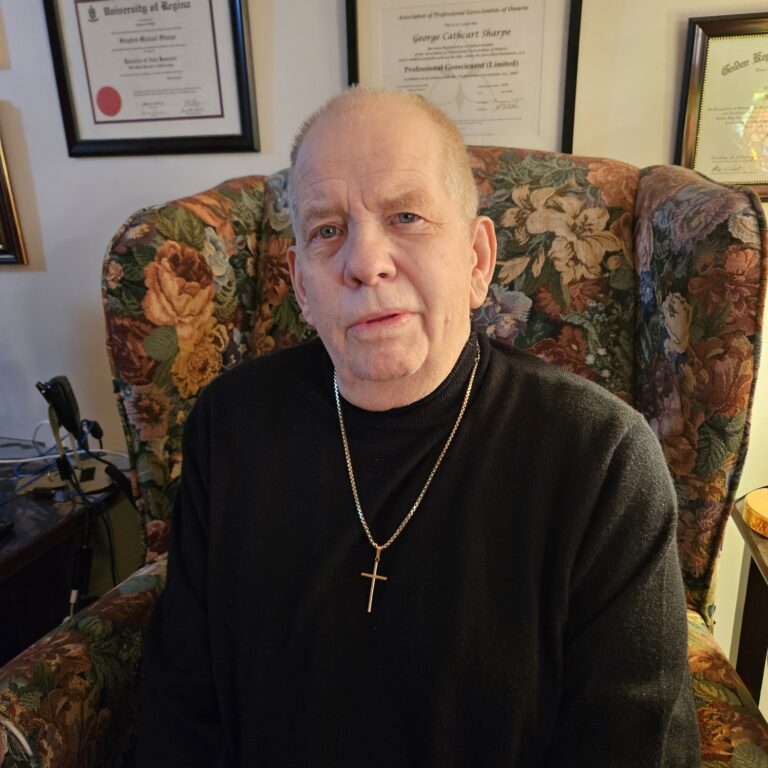- Home
- Member Profile
- George Sharpe, Geoscience Licensee
Member Profile
George Sharpe, Geoscience Licensee
December 13th, 2024
Tell us about your personal background.

I was born in Winnipeg, Man., into a family well known for politics, business and contributions to the arts. My grandfather and my uncle were mayors of Winnipeg. But politics and business weren’t my first love growing up; science and nature were.
What drew you to geology as a career?
I got most of my joy in childhood exploring nature. In Grade 3, one girl brought some rocks for the science fair. Her dad was a geologist. He had these beautiful specimens. I looked at those rocks and said, “I gotta have something like that.” I was fixated on them. “They were samples of massive sulphides from the Coppermine River area.” When I was about 13, there was a major iron ore discovery on Baffin Island (the Baffinland Iron Mine in currentday Nunavut). They showed it on the news. Sixty six per cent iron right out of the rocks. “I want to go there,” I told my mother. “Then you have to study hard,” she said. My dad went into engineering, but I was focused on the rocks and the love of making new discoveries. I decided then that I wanted to work on the exploration side. In 2010, I got to work there for one season as a senior geologist with a great bunch of professionals.
You’ve travelled all over the world doing exploration and survey work. Tell us some of your most memorable experiences.
In 1996, I took a job doing survey work in Mongolia. I had to survey the lines on a grid that was 18 kilometres by 10 kilometres – basically, the size of metropolitan Toronto laid out in the desert. We were there for seven months. The local diet was mutton: mutton fat, mutton soup, mutton everything. Sometimes we got lucky and might have goat. Goats are OK if they’re barbecued, but it can be a little bit chewy if you wind up with some of the fur still on the meat. One time when I was staying in a hotel in the Gobi Desert, I cut my leg open on a spring sticking out of the mattress. Somebody’s got a picture of me getting patched up in a clinic in the middle of the Gobi Desert. I’ve seen every possible climate you can imagine in every possible weather. And when you’re in the field, the number one thing you have to do is be aware of what can hurt you and kill you. Get your shots, take your malaria medication. I learned to listen to the locals. They’re not telling stories; they’re telling you the truth, what you have to watch out for.
Any mentors or role models you’d like to tell us about?
Jack Mollard, the founder of Regina based engineering, geoscience and environmental consulting agency JD Mollard and Associates, was a big factor in my life. Jack went out of his way to help me find work. When he didn’t have anything for me, he bent over backwards to make sure I got work somewhere. He was marvelously generous. He was that way all of his life. There was a fellow in Toronto named Laurie Curtis who encouraged me to start working overseas. “Everybody wants to stay in Canada, close to mom and dad. But if you’ve got overseas work on your resume, you’ll be remembered and recognized. It’s challenging work, sometimes life changing,” he said.